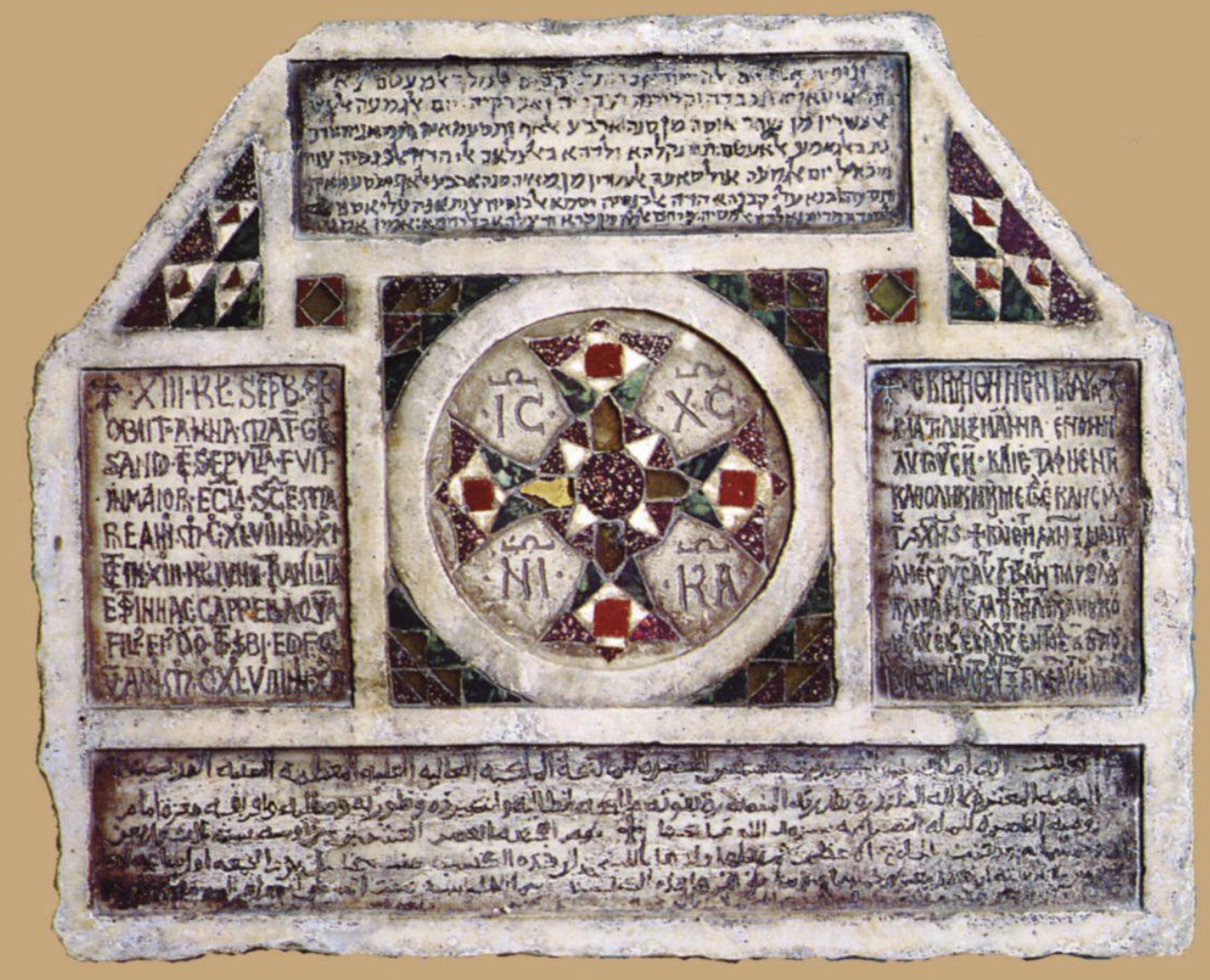
Christian Polemics Against the Co-production of Religious Identity in the Emirates of Córdoba and Sicily

Tombstone inscription in four languages (Arabic, Greek, Hebrew and Latin) commemorating Anna, the mother of Norman priest Grisanto, hold at the Museum La Zisa, Palermo. The languages of this tombostone are connected to the different religious groups of the island. The four versions provide dates based on their respective calendars: 1148 in the Gregorian calendar, 4904 in the Hebrew calendar, 6658 in the Byzantine calendar, and 543 in the Islamic calendar. [Source: Rita Bernini "Inscription in four languages" in Discover Islamic Art 2023]
My project delves into the dynamics of identity co-production between Christians and Muslims in the Emirate of Córdoba (7th-9th centuries) and the Emirate of Sicily (9th-11th centuries), with a specific emphasis on the perspective of Christian authors in these regions. The research aims not only to observe the phenomena of co-production in various fields, such as literature or liturgy, but also to understand how Christian authors perceive, portray, and respond to the idea that the emerging society was co-produced. This project not only uses religious co-production as an object of research for the modern historian, but also looks how this idea was used by contemporary Christian authors as an apologetic or polemical instrument.
First, I will analyze certain texts written by Iberian Christians of this historical period, known as the Mozarabs (Musta’rab, “Arabized”). My primary focus will be on the Indiculus Luminosus by Paul Albar of Córdoba. It is important to note that this work is not solely a polemical pamphlet against Muslims. Undoubtedly, the author does criticize the “Ishmaelites” using motifs commonly found in late antique heresiology, similar to those found in the writings of Epiphanius of Salamis and Philastrius of Brescia: Ishmaelites are depicted as pagans, cruel barbarians, and followers of a false prophet. However, at the same time, the most significant aspect of Albar’s work lies in his polemic against the Christians of his day. He accuses them of succumbing to corruption due to their collaboration with Muslims, causing the loss of an “identity” rooted in Romanitas and Christianitas: “Christians don’t know their laws, and Latins don’t remember their language” (Indiculus Luminosus 35). Albar’s writings refer to figures of his time, such as Samson of Córdoba, who for his efforts to promote coexistence with Muslims, faced animosity from the Cordovan clergy and was even accused of heresy. A comparison of the perspectives of various authors – including Paul Albar, Samson of Córdoba, and other polemicists like the Mozarabic abbot Speraindeo – will offer a diverse panorama of viewpoints on the interaction and co-production between Christian and Muslims. This comparison not only sheds light on their thoughts about the “others”, the Muslims, but also, more importantly, provides insights into the evolving co-produced identity of the Arabized Christians of al-Andalus. Thus, in my analysis of these authors, I intend to go beyond the representation of “otherness”. I will not only focus on the question “what are they?”, i.e. the Muslims, but also on the question “what are we, or what are webecoming in relation to them?”.
In my research on Umayyad Iberia, I will identify specific patterns and investigate whether similar patterns exist in other regions of the Western Mediterranean during the early Middle Ages. To this end, I will concentrate in particular on Sicily, as this island shares several similarities with Iberia in political, social, and geographical terms. The key question is whether the process of identity co-production which occurred in the Sicilian emirate is comparable to that among the Mozarabs in Spain. Additionally, I will explore potential differences between the Western part of Sicily, characterized by highly Arabized cities like Palermo, and the Eastern part, which includes cities such as Syracuse and Catania, often seen as the last bulwarks against the Arabization of the island. To explore this subject, I will examine the expedition of the Byzantine general George Maniakes to Sicily (1038-1040). Sent by the basileus Michael the Paflagonian, Maniakes seized the opportunity created by internal riots on the island to conquer its Eastern part. Within this context, I will analyse the reactions of Christian authors to Maniakes’ expedition and the arrival of the Byzantines, who were viewed both as liberators from Muslim dominance and oppressors undermining the freedom of the inhabitants of Ṣiqilliyya. These varying perspectives contributed to the co-production of the story of the expedition of this legendary general. In analyzing the polemics against co-production by the religious authorities of these areas, this project will contribute to our understanding of why religious communities have struggled (and, in some ways, continue to struggle) to consider themselves co-produced.